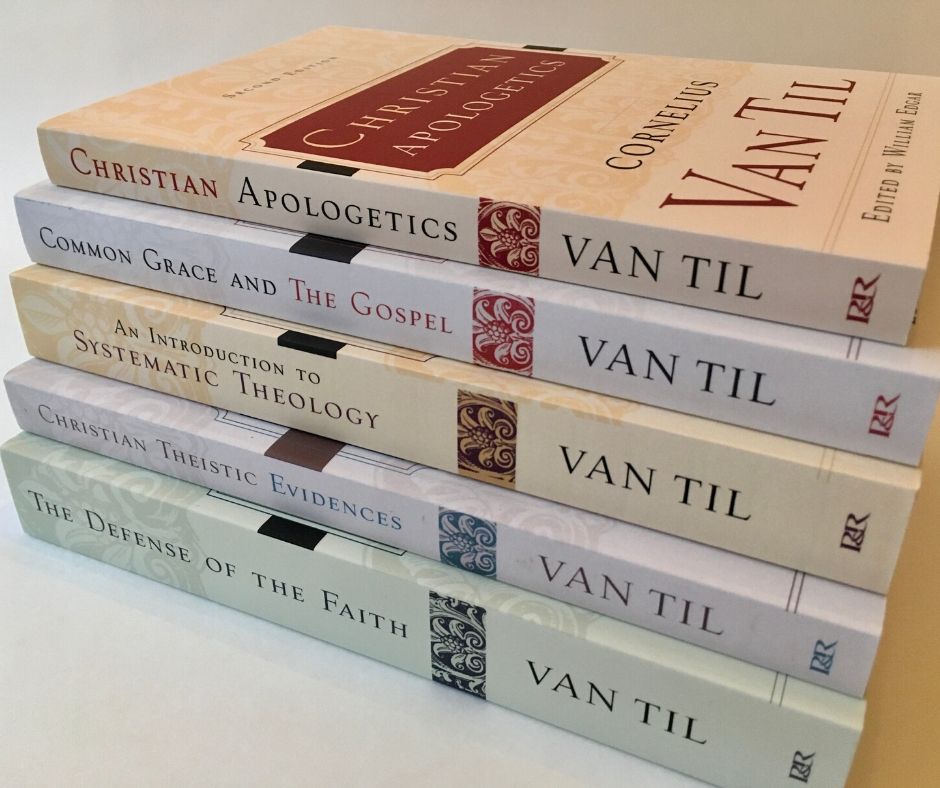Cornelius Van Til (1895–1987) was born in Grootegast, the Netherlands, and immigrated with his family to America in 1905. He attended Calvin College and Calvin Seminary before completing his studies at Princeton Theological Seminary and Princeton University with the ThM and PhD degrees. Drawn to the pastorate, Van Til spent one year in the ministry before taking a leave of absence to teach apologetics at Princeton Seminary. When the seminary reorganized, he was persuaded to join the faculty of the newly founded Westminster Theological Seminary. He remained there as professor of apologetics until his retirement in 1975. Van Til wrote more than twenty books, in addition to more than thirty syllabi. Among these titles are: Christian Apologetics, An Introduction to Systematic Theology, The Defense of the Faith, Common Grace and the Gospel, and Christian Theistic Evidences.

All students of apologetics should read at least one book by arguably the most important apologist of the twentieth century: Cornelius Van Til. The single best point of entry into Van Til’s writings is Christian Apologetics.
Here Van Til presents the underpinnings of his uniquely biblical approach. He shows how Christian apologetics is rooted in a unified system of scriptural truth, a worldview that encompasses all spheres of knowledge. Noting the ultimate conflict between Christian and non-Christian systems, Van Til sets forth a method of argument that centers on an all-important, biblically defined point of contact with the unbeliever.
In this the first typeset edition, William Edgar sheds light on Van Til’s approach by adding a new introduction and explanatory notes.
The theological foundations of Van Til’s defense of the faith are set forth here as the unified system of truth to which believers are committed and with which nonbelievers need to be confronted.
Writes Van Til: “The Christian faith as a whole, as a unit, must be set over against the non-Christian faith as a whole. Piecemeal apologetics is inadequate, especially for our time. A Christian totality picture requires a Christian view of the methodology of science and philosophy, as well as a Christian view of theology.”
Thus Van Til explores the implications of Christian theology, particularly for philosophy, as he discusses epistemology, general and special revelation, and the knowledge and attributes of God.
This newly edited and typeset edition features an introduction and explanatory notes by William Edgar.
This new annotated edition of The Defense of the Faith restores the full text of the original work in a form that is more easily understood. Cornelius Van Til, who taught for more than forty-five years at Westminster Seminary, sometimes used philosophical vocabulary in The Defense, and many of his conversation partners and critics were not widely known. When later editions greatly abridged this work for these reasons, valuable discussions were laid aside.
Now they are restored, and with added clarification. Newly edited and retypeset, this unabridged edition features a foreword and explanatory notes by K. Scott Oliphint, which help us grasp a method of apologetics consistent with the nature of Christianity itself and continually relevant to our time.
What point of contact does the Christian have with the world in order to bring the biblical message to the nonbeliever? How can the doctrines of election and total depravity be reconciled with the universal offer of the gospel and human responsibility? Does our Lord show favor to saint and sinner alike?
Restoring the full text of the original 1972 work, this collection of annotated essays addresses questions on common grace and its relevance to the gospel. A pioneer in presuppositional apologetics, Cornelius Van Til sets forth a Christian philosophy of history; examines the views of Abraham Kuyper, Herman Hoeksema, and others in the debate over common grace; and replies to criticism.
When defending Christianity, we often play by man’s rules, letting secular science and philosophy determine the cards we’re allowed to bring to the table. But can we effectively defend the primary authority of Scripture if we start with other sources of authority that relegate it to minor status from the outset?
K. Scott Oliphint provides a foreword and explanatory notes in this retypeset syllabus, originally from Cornelius Van Til’s famous Christian Evidences class at Westminster Seminary. Van Til argues for the defense of a pure, full-fledged Christianity, unadulterated by a scientific methodology founded on non-Christian assumptions. He offers us instead a Christian philosophy and methodology for defending the faith that presupposes the absolute authority of the triune God of Scripture.

Presuppositional Apologetic’s Links: Third Week of May 2020 | The Domain for Truth
-[…] 10.) CORNELIUS VAN TIL […]
Andres
-Do you have plans of republish the other Van Til works with notes of Scott. K . Oliphint and William Edgar?
Like: Psychology of Religion, The New Modernism, A Survey of Christian Epistemology, A Christian Theory of Knowledge, The Doctrine of Scripture, (Volume 1), The Reformed Pastor and Modern Thought, etc.
Blessings from Mexico!